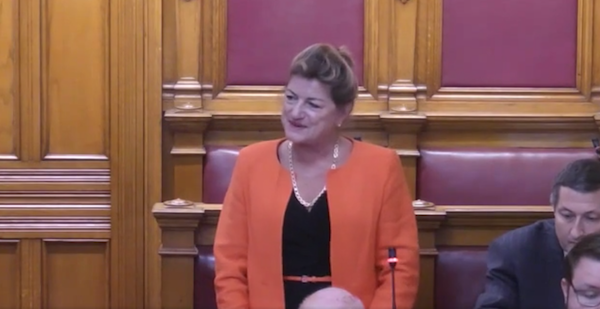

Controversial waste disposal charges for businesses will have to be reconsidered by the States Assembly in order to plug an £11million funding gap, the Treasury Minister has warned.
Deputy Susie Pinel’s comments came just one week after it was revealed the States would suffer a £30million to £40million deficit in the coming years if urgent action isn’t taken.
Plans for a commercial waste charge covering businesses, charities and sports clubs, which originally formed part of the government’s Medium Term Financial Plan, were supposed to have finally been agreed last year.
However, following concerns that there hadn’t been enough consultation with key industry stakeholders, the idea was shelved in the autumn.

Pictured: Deputy Susie Pinel, Treasury Minister.
But now new Treasury Minister Deputy Susie Pinel has stated that the idea, which was supposed to generate £11million to fund public services, “will have to be revisited.”
Branding the decision to shelve the charge “injudicious”, she described the funding gap left as a “a huge sum of money” that “has to be found.”
She said that the proposals would not be brought by her department, but nonetheless added that States Members would have to “think seriously if it were rejected again where that sort of money could be found.”
Her comments came in during a Scrutiny Panel hearing yesterday, in which she also warned that the Long Term Care (LTC) Fund, which provides financial help to households with long-term care needs, was “just about balancing” and may need to increase amid the pressures of an aging population.
“I know some people see it as a tax as it’s taken off income, but it is ringfenced to long-term care,” she explained. Referring to the island's increasing portion of older people, she added: “You’ve got to look ahead to see that the fund is able to cope with the demand.”

Pictured: The Treasury Minister described the LTC Fund as "just about balancing."
An independent report on the LTC Fund released this morning by Social Security Minister Deputy Judy Martin backed those remarks.
It found that costs are expected to grow more quickly than income, in line with the number of older people, particularly those aged 80 years and above, over the next 25 years.
As a result, it recommended that the current contribution rate of 1% will need to increase steadily over the next 25 years, with the first rise of 0.5% recommended in 2020.
Deputy Martin has now pledged to act on that recommendation, commenting: “I welcome this independent report, the first since the Scheme started, and am pleased to see that the fund is performing as expected following the research already carried out.
“To ensure that the Fund can continue to provide support to households in the future, it’s likely that I will include a 0.5% increase in the long term care contribution rate in the 2020 Government Plan, which will be debated by the States next September.”
Comments
Comments on this story express the views of the commentator only, not Bailiwick Publishing. We are unable to guarantee the accuracy of any of those comments.